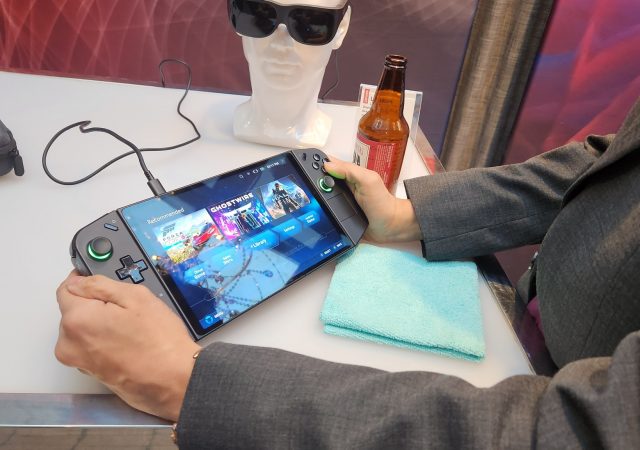 |
| apple ipad |
these are the voyages of the starship ente… oh nevermind.
tablets, man. tablets. they’re the latest front on which the mobile wars rage. desktops and laptops have pretty much become commoditized, and even the cell phone war has been a game of “who can beat the iphone,” even though in my opinion the droid x does (shh, don’t tell anyone, i’m trying to be impartial). after the surge of netbooks since 2007, they and their cousins the tablets would naturally have to come next.
so, next question – what the hell IS a tablet? why are they here? and what do they want with us? with the release of the ipad earlier this year, the big tech giants aren’t exactly in agreement – steve jobs says the ipad and tablets exemplifies the end of the “mouse and keyboard” pc era, while steve ballmer’s opinion is basically that the ipad and other tablet devices ARE, in fact, pc’s. this all aside, “tablets,” as they were, have been around for a pretty long time. we all (well some of us anyway) remember running windows xp tablet edition, waaaay back when the definition of a tablet pc really wasn’t much more than a laptop with an outward facing screen and some limited pen input.
that definition has changed from then to now. a lot. and it only partially has to do with technology, as far as being an evolution from the netbook. beyond that, the definition of tablet really changed with an evolved definition of the user. you have your business users, home users and tech enthusiasts – the trinity that ruled consumer electronics for so long, and now a new class – the mobile media user. these users don’t want high-grade graphics and cpu power for gaming or power for editing. they’re not concerned with exchange push or being able to open up office to do some work. they’re on the move – watching youtube on the train or tv through hulu on the bus, running fluff web apps and playing low-res, low-power games (that can still be extremely fun). so all this considered, what is a tablet, finally? with all the opinions floating around it’s far to say that it’s a hybrid. a “netbook plus,” built for media consumption. less than a laptop or notebook, a low-power device running on something like an ARM or intel atom processors with a light operating system, that doesn’t have the power to run high-end games and intensive applications. more than a cell phone, with larger screens for better media viewing and everyday usability.
 |
| android-powered archos 5 tablet |
and understanding this concept is what will sell mobile units in today’s media-hungry markets. it’s why smartphone sales have skyrocketed in the last few years. apple does, which is why their ipad is at the forefront of the market. microsoft on the other hand, does not. at least to me. steve ballmer’s goal is now to focus a big push on getting windows 7 on a tablet form-factor unit, as is their solution to most things – put some windows on it, to make windows a ubiquitous platform for every user. not because he thinks it’s a viable platform, but because he needs to compete with apple. from the recent microsoft financial analysts meeting:
“they sold certainly more than I’d like them to sell, let me just be clear about that. We think about that. We think about that in competitive sense. And for us, then, the job is to say, Okay, we have a lot of IP, we have a lot of good software in this area, we’ve done a lot of work on ink and touch and everything else — we have got to make things happen.”
ironically this comes almost simultaneously to killing the their own courier tablet project, which sucks, because that thing looked straight awesome. unfortunately their mobile game still needs some work, from what we’ve seen of the windows phone 7. yes, “make things happen” indeed. windows 7 tablets were shown off at CES 10 in january on an hp slate, but they have since dropped windows 7 in lieu of the (probably) webOS platform, which they now own through their palm acquisition. HP’s not alone in that decision – others have also skipped over windows 7 in favor of the android platform for their tablet – asus, samsung, and archos just to name a few.



T-man, impressive post as usual.
The thing missing — and the thing I hope android provides — is a cheap alternative. iPad looks great, but I can buy a lot of stuff for $500, the cost of the cheapest version. If these are truly filling a niche right next to netbooks (say that 5x fast), they must be cheap. E.g., I can buy a sweet Asus eee for <$400. Can't say the same about a tablet.
you're definitely right on prices. the only android tablet i've seen widely available under that $400 mark is the archos 7 for around $200 (the archos 9 is $550). for the tablet makers to be price competitive, there has to be more players in the market, which just hasn't occurred yet. unfortunately a lot of tablets have experienced release delays, including those who are ditching win7 embedded for android.
in my opinion something that will accelerate the android tablet movement will be froyo (android 2.2). that will fill in things apple doesn't offer, like flash support, which would make it more attractive than an ipad to some. on top of that, android 3.0 "gingerbread" is slated to be available late this year, and is rumored to be a big improvement over the current android OS's. i would say wait until late fall / winter and you'll start to see prices become a little more attractive, perhaps just in time for the holidays.
as far as the niche it serves, i think that's still being carved out. tablets are still more of a "want to have" as opposed to a "need to have" item, but again, with more options in the market, that may change over time.
One of my autistic students has one for his daily use at school (dad is a big tech guy). His parent is now questioning the need for him to even be taught handwriting since he will have his ipad or something like it accessible for the rest of his life….
i'm a big proponent for technology in the classroom, especially advances made in using technology for teaching special needs students. but i completely disagree with the growing "handwriting is unnecessary" sentiment. even though i write very little these days, pen to paper still has its place.
but then again, you've got the experience here – how is that working out for your student?
things like tablets and other mobile tech are already everywhere and will just proliferate from here, in both numbers and scope. i hope it doesn't get to the point where tech becomes a replacement for skill – i still believe the two have to be used in conjunction, instead of relying on the former while ignoring development of the latter. i already fear the generation that relies on texas instruments rather than their brains when it comes to simple arithmetic. i guess writing is next.
plus, as far as communication tools go from a resilience standpoint, it's a lot harder to break your writing hand than it would be to drop a tablet.